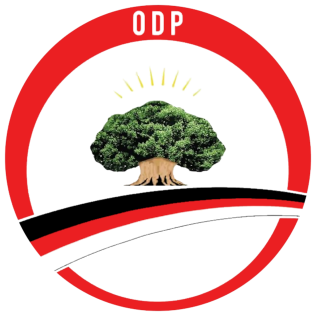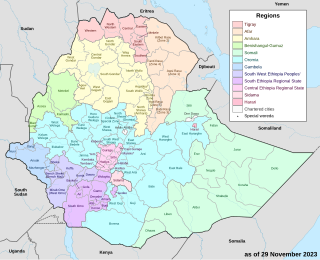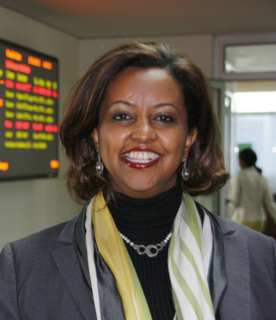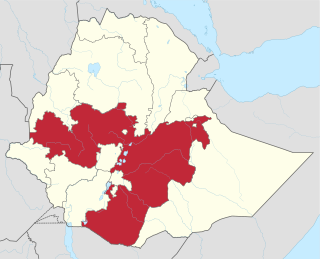The Oromo are a Cushitic ethnic group and nation native to the Oromia region of Ethiopia and Kenya who speak the Oromo language as their mother tongue, which is part of the Cushitic branch of the Afroasiatic language family. They are the largest ethnic group in Ethiopia and represent 34.5% of Ethiopia's population.

Addis Ababa, also known as Finfinne, is the capital and largest city of Ethiopia. It also serves as regional capital of Oromia. According to the 2007 census, the city's population is estimated at 2,739,551 inhabitants. A highly developed and important cultural, artistic and financial centre, Addis Ababa is a chartered city.

Ethiopia, officially the Federal Democratic Republic of Ethiopia, is a landlocked country in the Horn of Africa. It shares borders with Eritrea and Djibouti to the north, Somaliland to the northeast, Somalia to the east, Kenya to the south, South Sudan to the west and Sudan to the northwest. Ethiopia has a total area of 1,100,000 square kilometres (420,000 sq mi) and over 117 million inhabitants and is the 12th-most populous country in the world and the 2nd-most populous in Africa after Nigeria. The national capital and largest city, Addis Ababa, lies several kilometres west of the East African Rift that splits the country into the African and Somali tectonic plates.

Oromo is an Afroasiatic language that belongs to the Cushitic branch. It is native to the Ethiopian state of Oromia and spoken predominantly by the Oromo people and neighbouring ethnic groups in the Horn of Africa. It is used as a lingua franca particularly in Ethiopia and northeastern Kenya.

Oromia is a regional state in Ethiopia and the homeland of the Oromo people. The capital city of the State of Oromia is Addis Ababa, also known as Finfinne. Currently the state consists of 21 administrative zones.

Jimma is the largest city in southwestern Oromia Region, Ethiopia. It is a special zone of the Oromia Region and is surrounded by Jimma Zone. It has a latitude and longitude of 7°40′N36°50′E. Prior to the 2007 census, Jimma was reorganized administratively as a special Zone.

The Oromo Democratic Party was a political party in Ethiopia, and part of the alliance with the Amhara National Democratic Movement, the South Ethiopian Peoples' Democratic Front and the Tigrayan Peoples' Liberation Front that forms the Ethiopian People's Revolutionary Democratic Front (EPRDF). In the August 2005 Regional assembly elections, the party won 387 out of 537 seats in the Oromia, and 14 out of 36 seats in the Harari Region.

The Oromo Federalist Democratic Movement was a political party in Ethiopia, created in 2005 by Bulcha Demeksa to further the interests of the Oromo people as an alternative to the armed Oromo Liberation Front. In the 15 May 2005 federal election, the party won 11 seats, all from the Oromia Region. In March 2006, the party Whip was Mesfin Nemera Deriesa from the West Wallaga Zone. The OFDM merged with the Oromo People's Congress (OPC), forming the Oromo Federalist Congress (OFC), in 2012.

Jimma is a zone in Oromia Region of Ethiopia. Jimma is named after former Kingdom of Jimma, which was absorbed into the former province of Kaffa in 1932. Jimma is bordered on the south by the Southern Nations, Nationalities and Peoples Region, the northwest by Illubabor Zone, on the north by East Welega Zone and on the northeast by West Shewa Zone; part of the boundary with East Shewa Zone is defined by the Gibe River. The highest point in this zone is Mount Maigudo. Towns and cities in Jimma include Agaro, Limmu Inariya and Saqqa. The town of Jimma was separated from Jimma Zone and is a special zone now.

East Welega is one of the zones in the central Oromia Regional State of Ethiopia. This administrative division acquired its name from the former province of Welega. Towns and cities in this zone include Nekemte.
Ali Mahammed, known professionally as Ali Birra, is an Ethiopian singer who performs in the Oromo language.inni Obboleeysa Feeysal Abditi Birra is regarded as the most popular Oromo icon, as well as an influential artist in the other regions and urban areas of Ethiopia.
Bulcha Demeksa is an outspoken Ethiopian politician and businessman. He is the founder of the Oromo Federalist Democratic Movement (OFDM), one of Ethiopia's largest opposition parties.
Yeroo was the first private Afaan Oromo newspaper published in Qubee. It distributed weekly newspapers mainly around the cities and towns of the Oromia region of Ethiopia. Alongside another independent newspaper URJII, Yeroo was the last private Oromo press closed down due to media restrictions in Ethiopia. Due to being independent, the media faced difficulties from the Ethiopian government since its beginning during its registration and establishment. A few weeks after its publications, security problems and financial restrictions imposed by the government caused the newspaper to be suspended. Its website version is Jimma Times (JT), which has remained online after Yeroo newspaper was closed. JT has been the first media to break several news stories before other media outlets, including the story of former Ethiopian PM Tamrat Layne, who became "born again" and left politics, the acceptance of Ethiopian Airlines into the Star Alliance as well as on the decision of the top opposition party Medrek to seek a re-run of disputed Election 2010. Various international media have used news content from Yeroo's Jimma Times, including United Press International (UPI), Epoch Times and Voice of America (VOA) radio. The Jimma Times has also been quoted by and its content used by many Ethiopian newspapers and sites including Capital Ethiopia, Addis Neger, Gadaa.com, Opride.com, Ethio Channel, Awramba Times and African Monitor. Its website/online version has also been suspended for many years after it faced frequent blockage from the government that often censors online media.
Kuma Demeksa is an Ethiopian politician. Since 24 April 2015 he has been Ethiopian Ambassador to Germany. From 2008 to 2013 he was mayor of Addis Ababa; previous positions include President of the Oromia Region (1995–2001), and Minister of Defense (2005–2008). He was one of the founders, as well as a current member, of the Oromo Peoples' Democratic Organization (OPDO), which is part of the ruling coalition, the Ethiopian People's Revolutionary Democratic Front (EPRDF).

Eleni Zaude Gabre-Madhin is an Ethiopian-born Swiss economist, and former Chief Executive Officer of the Ethiopia Commodity Exchange (ECX). She has had many years of experience working on agricultural markets – particularly in Sub-Saharan Africa – and has held senior positions in the World Bank, the International Food Policy Research Institute (Washington), and United Nations (Geneva).

Ethiopia held nationwide elections for local offices in the kebele and woreda assemblies on 13 and 20 April 2008. By-elections were also held for seats in the Addis Ababa City Council, and in the national and regional parliaments that were vacant due to the Coalition for Unity and Democracy’s (CUD) refusal to participate at the same time. By law, the local elections were supposed to be held as part of the 2005 general elections, but due to the resulting unrest they were postponed.

The presidential election held on 7 October 2013, was the fourth presidential election of the Federal Democratic Republic of Ethiopia to elect the country's third president. Mulatu Teshome was elected by the parliament to a six-year term. Incumbent president Girma Wolde-Giorgis is barred from seeking re-election due to term limits.

The Oromo conflict is a protracted conflict between the Oromo Liberation Front (OLF) and the Ethiopian government. The Oromo Liberation Front formed to fight the Ethiopian Empire to liberate the Oromo people and establish an independent "Oromia state". The conflict began in 1973, when Oromo nationalists established the OLF and its armed wing, the Oromo Liberation Army (OLA). The formation could be in response of prejudice against Oromo people during the Haile Selassie and the Derg era, where their language exclusively banned from public administration, courts, church and schools, as well as stereotype which posited Oromo people as hindrance of expanding Ethiopian national identity.










